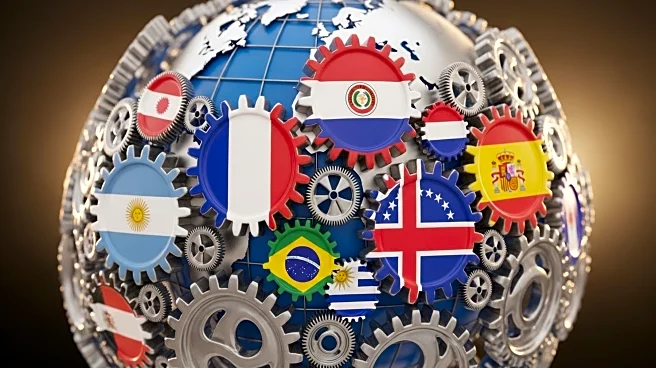What's Happening?
South America's Mercosur bloc, comprising Argentina, Brazil, Paraguay, and Uruguay, has signed a free trade agreement with the European countries of Iceland, Liechtenstein, Norway, and Switzerland. This deal, finalized in Rio de Janeiro, establishes a free trade zone encompassing nearly 300 million people and a combined GDP exceeding $4.3 trillion. The agreement covers various sectors including goods, services, investment, and intellectual property rights. The signing comes amid global trade tensions, notably due to tariffs imposed by President Trump on several countries, including a 50% tariff on Brazil. The deal is expected to lower prices for Swiss chocolate and Norwegian cod in South America, while European countries may benefit from cheaper beef imports. Each participating country must ratify the agreement for it to take effect.
Why It's Important?
The trade deal signifies a strategic move by the Mercosur bloc to diversify its trade partnerships in response to U.S. tariffs, particularly those affecting Brazil. By enhancing market access for over 97% of exports, the agreement aims to boost bilateral trade, benefiting businesses and consumers on both continents. This development underscores the importance of international trade rules amidst rising protectionism. Additionally, the deal may serve as a stepping stone for Mercosur's larger free trade agreement with the European Union, which remains pending ratification. The agreement highlights Mercosur's willingness to align with EU standards, potentially strengthening its position in future negotiations.
What's Next?
The Mercosur bloc is looking to ratify the agreement with the European Union, which was agreed upon last December after 25 years of negotiations. Brazil is also pursuing trade negotiations with other countries, including the United Arab Emirates, Canada, Mexico, and India. The successful ratification of these agreements could further diversify Mercosur's trade relationships and reduce reliance on U.S. markets. Observers suggest that the EU-Mercosur deal has gained importance following the U.S. tariffs, prompting Brazil to seek new trading partners.
Beyond the Headlines
The trade deal reflects broader geopolitical shifts, as countries seek to mitigate the impact of U.S. trade policies by forming new alliances. It also highlights the role of multilateralism in strengthening economic ties and fostering global cooperation. The agreement may influence other regions to pursue similar strategies, potentially reshaping global trade dynamics.









